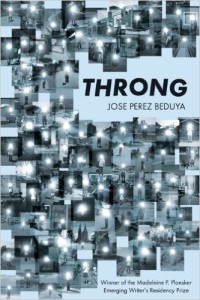Liza Flum reviews Jose Perez Beduya’s Throng

Jose Perez Beduya
Throng
&NOW Books, 2012
ISBN: 9780982315675
Like the flashlights that cut through the nocturnal landscapes of his poems, Jose Perez Beduya’s Throng is a book that flickers. We catch glimpses of fields, then caverns, then people huddling inside the caverns. We may have seen an angel or a policeman, but it may have been a machine. The ocean waves look like “the beginning of a face.” In Beduya’s shifting, elliptical lines, we experience emotional disorientation and spatial displacement while gradually piecing together physical and psychological loss, glimpse by glimpse. This prophetic collection of poems imagines a people who sing, hum, and lament their way beyond a personal, political or environmental disaster: “When our world ended/ We were not changed.” Throng invites us to enter this psychic space of displacement through the voices of a communal “we,” as well as an “I” and “you” that merge and separate inside this collective consciousness.
The collective voice is the engine of Beduya’s collection, and it is also shifting; it is at once intimate and abstract, sensuous and disembodied, emotionally dissociated and passionate:
Circled and bit us
We administered miraculin
Our bellies filled with dull ringing
Reminding us of our successes
And failures with rice
Our nights were states of inaction
But we rustled when we worked
Side by side on the factory floor
Interrupted only by sudden birth cries
We forgave each other
Our not dancing
We were very good with absence
When our world ended
We were not changed
Like much of Throng, these lines contain startling shifts of agency. Is sorrow an animal, and why is it stalking us? When we “rustle,” are we humans or objects? This is a world where the sweetness of miracles become “miraculin;” where an ecstatic ringing of bells echoes hungry “bellies;” where the productivity of factories overlays human reproduction. This poem takes place within a dreamlike factory space, which defines one of the imagistic poles of the book. Elsewhere we wander into a landscape of broken pastorals: fields, gardens, tables laden with food. In this polarized world, we can speak with either a “factory voice” or “wilderness;” we flicker between a dissociated, technologized subjectivity and a vulnerable state of embodiment.
To read Throng is to engage is a startling sensory exploration. The way eating in the dark makes taste and touch more vivid, the profound disorientation of Beduya’s poems makes their physical perceptions intense and startling— and uniquely capable of calling us back, suddenly, into our breathing human bodies. These poems are unpunctuated, with complex syntax meted out gradually over short, rhythmic lines. While leaving us situationally unmoored, these lines offer surprisingly specific physical details, asking us to readjust our intellectual understanding and sensory perceptions at each turn:
With companion devices
An evening melody
On our lab coats
Has overstayed
Our record- and peace-
Keeping done remotely by objects
Shiny and swift
On which their owners’
Faces are inverted
Our money becomes
Water or rust
In larger markets
The old crowds
Are as soft
As they are deep
In the olive
Harvest of our hands
I’ve given this long except, from “Work Song,” to try to show the ways that each line’s limited aperture, separated by stanza breaks and white space, creates a strobe effect. We see this world in vivid flashes that advance in sudden, jerky movements. Each perception is precise and highly illuminated before it drops into darkness again. These decontextualized images are both disorienting and exhilarating, drawing attention to our momentum as we hurtle from line to line.
Dancer-like, Beduya’s consciousness spins above, below, and through a scene, mapping the speakers’ movement through his vividly described yet fragmented landscape. A “diagram of pure thinking,” his book charts each part of its imagined topography through grids, road maps, and aerial views. The book begins in a “field,” an open space that is the site of searches, riots, harvests, and excavations. The people move through this field, above it, below it, and they gradually integrate into it completely. As the speakers’ experiences are projected onto this open “field,” their spatial position begins to suggest changes in political power and emotional states.
Throughout the book, the speakers experience dizzying shifts of perspective. They yearn upwards towards the sky where searchlights and stars appear. In moments of hopeful ascent they find themselves “dancing on rooftops.” Their viewpoint is also projected upwards, so that they can look down on their lives “from a great height.” This elevation offers glimpses of clarity and sometimes compassion: our “wounds form a pattern/ Seen from the air.” At times, it seems that hovering above the fields would invite redemptive self-understanding: there might be a “face in the fields/ Seen only from a great height.” But this overarching sight is not benevolent, and this broadened perspective shifts into a panopticon. Throughout, the speakers also are eerily aware of an oppressive “leadership/ Floating above us.” This presence is sometimes described as “the great wheel” or the “Bright Wheel,” a suveilling presence invoked in a repeated poem cycle “Inside the Bright Wheel.” There are also “helicoptering / Angels” surveilling the scene, promising both redemption and militaristic oversight. The police state has been conflated with paradise, and the “wings of cops” flutter in a failed dream of security.
Caught within their field, the people sometimes attempt to inscribe descent onto the landscape:
And caves of our country
Grew inverted
We kept digging
Moving downwards into the earth may offer shelter from technological and political surveillance. In a knowing reversal of the fall from grace, there may be redemption, for these speakers, in their downward motion: “To awaken is to descend.” To fall, in this book, is to recover your corporeal self, to “Use your wilderness/ Not your factory voice.” Beduya’s memorable “The Reunification of the Body” begins with the command to “Stay down beside your confirmation number/ And be somebody’s garden.” The poem goes on to remind us of a previous descent: “Remember that you fell.” In falling, there is at least a chance at grace: “Lowness becomes a new heaven.” Yet this movement of descent gathers momentum, until it is an automatic gesture: “Hands descend/ Hairs and fevers/ Descend/ Meats/ Descend/ Voices and likenesses descend…” Even the speakers’ spontaneous yearning towards wilderness can become automated.
This downwards movement into the landscape is also destructive, as the field itself is transformed into a cave. The speakers’ decent “inverts” their landscape. This excavation might create the “hiding place” referenced in the book’s final poem, a welcome refuge, where “depth bloomed everywhere.” However, the “many-years’ descent/ Through dust” has limits, and the book ends with the speakers still yearning towards the sky, from the bottom of an excavation site they have created, waiting for rain.
Published in 2012, Beduya’s Throng continually refreshes itself against our political backdrop. The “Bright Wheel” that monitors his community could be any of the agents of a surveillance state. Waves of displacement sweep through the people of Throng, and they are at once swept up in migrations, caught in factories, tied to cubicles, and rapt in front of screens consuming news of these events:
Myself and extract
People now living in tents
There is no end to them
They want to talk to our houses
This could be the portrait of any viewer of the daily news watching the crises of migrants, or it could be a person affected by his own displacement. In one of Beduya’s signature moves, the speaker of this poem is revised line-by-line, drawing and redrawing boundaries around a shifting self. At first, he grows empathetically expansive, describing refugees in a fragile poetics of witness. Then these displaced people turn accusatorily towards him and a line is redrawn between “them” and us. Who are “they” are who are “we”? Who is capable of speaking? Are the “houses” we live inside, and our structures of privilege, more worthy of address than we are? In a book where the word “I” is almost never uttered, the gesture of “reach[ing] deep inside” seems reminiscent of a Romantic poet speaking out of his solitude— but then this stable self proliferates into endless configurations of “an actual and virtual /Homelessness.” In Throng, the speakers are both flattened and transformed by their displacement, their bureaucracies, and their use of language: “All we are / Are our papers.” This phrase is both a testament to the losses of migration and to the power of the written pages in our hands. At its most ambitious, this book becomes not just an utterance but a world and all the people living in it.

Liza Flum lives in Ithaca, New York where she is a lecturer at Cornell University. She holds an MFA in poetry from Cornell, and she is a poetry editor for Omnidawn.